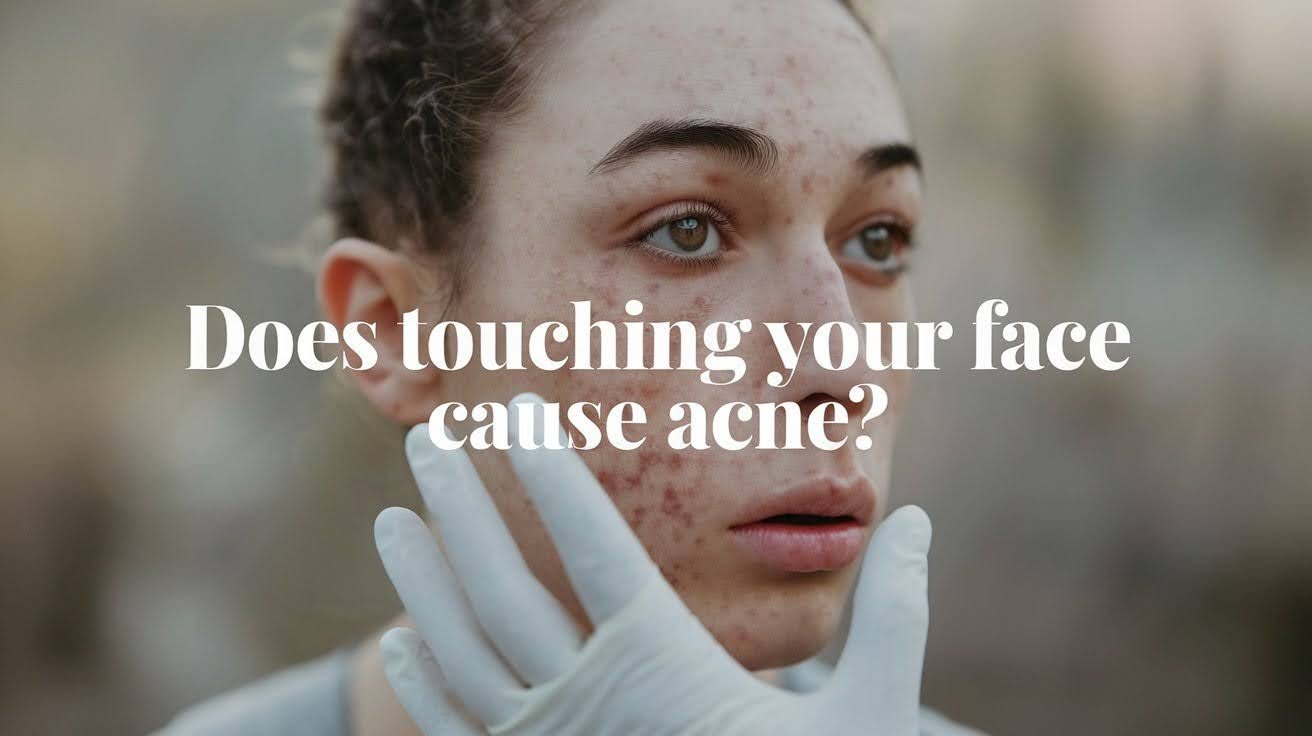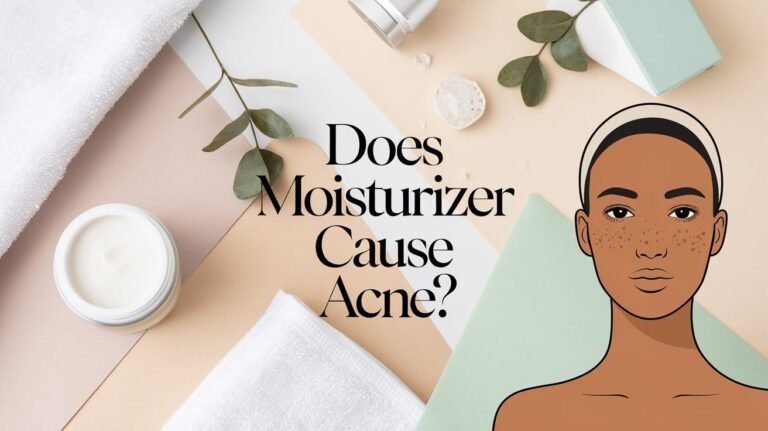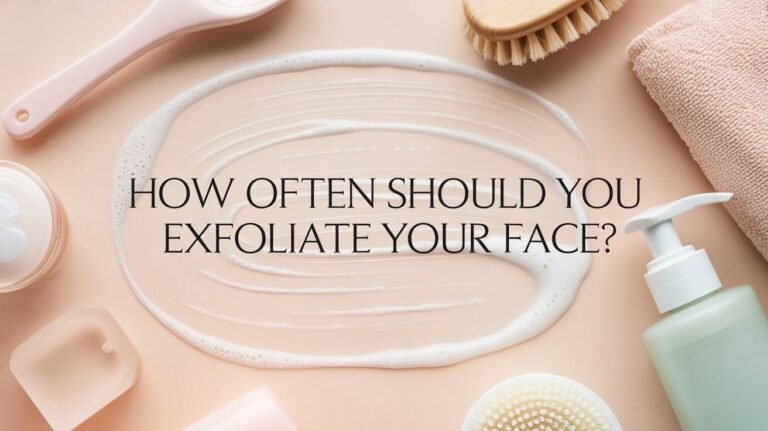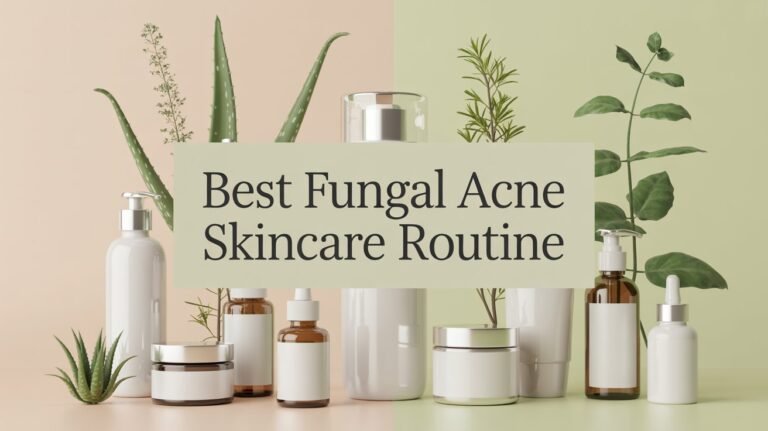Does Touching Your Face Cause Acne?

I touch my face all the time without thinking about it. Does touching your face cause acne? The short answer is yes, it can make breakouts worse.
In this article, I’ll show you exactly how this habit affects your skin and what you can do about it.
You’ll learn why your hands transfer bacteria to your face, how everyday items make things worse, and practical ways to break the cycle.
I’ve struggled with this myself, so I understand the frustration.
Let’s figure out how to keep your skin clearer together.
Why Touching Your Face Can Worsen Acne?

Your hands touch hundreds of surfaces every day. Doorknobs, phones, keyboards, and money all carry bacteria and dirt.
When you rest your chin on your hand or scratch an itch, you transfer all of that onto your skin.
Your pores get clogged, and pimples appear where your hands touch most often. Picking at a pimple introduces more bacteria into the infected area.
Rubbing or squeezing causes tiny tears in your skin. Your face gets red and swollen.
Healing takes longer, and scars become more likely to form. Your fingertips also have natural oils that mix with the sebum your skin already produces. This extra oil clogs pores and creates more breakouts.
Common Habits That Can Make Acne Worse

Beyond your hands, several everyday items press against your face and contribute to breakouts you might not expect.
Using Dirty Sports Equipment and Masks
Sports equipment and reusable masks collect sweat, oil, and bacteria. Clean and disinfect after each use to prevent transferring germs to your skin.
Pressing Your Phone Against Your Face
Your phone screen collects bacteria, oil, and dirt throughout the day. Clean it daily with antibacterial wipes to avoid breakouts.
Sleeping on Dirty Pillowcases
Pillowcases absorb oil, sweat, and dead skin cells nightly. Wash them at least once a week to keep bacteria away.
Reusing Towels Too Long
Towels stay damp and collect bacteria between uses. Use fresh towels regularly and avoid sharing them.
Not Cleaning Makeup Brushes
Dirty brushes spread product buildup, oil, and bacteria across your face. Wash them weekly with gentle soap.
Skincare Habits to Minimize Acne Risk
Good hygiene practices protect your skin even when you slip up and touch your face occasionally.
Clean Your Face Right
Clean your face twice a day with a gentle cleanser. Morning and night work best for most people. Choose a formula that matches your skin type.
Some people benefit from chemical exfoliators. Others need something more basic. Just don’t overwash. Stripping your skin actually makes it produce more oil to compensate.
Moisturize and Treat Spots
Even oily skin needs moisture. Use a lightweight, non-comedogenic moisturizer that won’t clog your pores. Your skin will balance better when it’s properly hydrated.
When pimples appear, use spot treatments instead of picking at them. Benzoyl peroxide or salicylic acid work well for most people.
Protect From Sun
Wear SPF 30 or higher every single day. Sun exposure makes acne marks darker and more visible. It also irritates active breakouts.
Protecting your skin from UV damage helps prevent those dark spots that linger long after the pimple heals.
Practical Tips to Break the Face-Touching Habit
Changing this behavior takes awareness and effort, but it’s completely possible with the right strategies.
- Start paying attention to when you touch your face. Is it during work? While watching TV? When you’re stressed? Once you identify your triggers, you can work on stopping yourself.
- Set reminders on your phone to check in with yourself throughout the day.
- Ask a friend or family member to point it out when they see you doing it.
- Give your hands something else to do. Stress balls work great at your desk. Fidget toys can help during meetings or classes.
- When your hands are busy with something else, they can’t touch your face. It’s a simple redirect that really works.
- Wearing gloves for a few hours can increase your awareness dramatically. You’ll notice immediately when you try to touch your face.
- Use visual cues like a rubber band on your wrist or a small note on your desk to remind you to keep your hands away.
When to Consult a Dermatologist
- Sometimes changing habits isn’t enough to control persistent acne
- See a dermatologist if over-the-counter products aren’t working after a few months
- Get professional help if your acne is leaving scars or dark marks
- Consult an expert if breakouts keep getting worse
- Treatment options include prescription medications, laser treatments, microneedling, or PRF injections
- Early treatment prevents long-term damage to your skin
- Don’t wait until the problem becomes more serious
Conclusion
I know how frustrating acne can be, especially when you realize your own hands might be making it worse.
The good news? You now have the tools to change that. Start with one small habit today.
Maybe it’s cleaning your phone or putting a stress ball on your desk. Progress takes time, but your skin will thank you.
What’s one thing you’ll try first? Drop a comment below and let me know how it goes!
Frequently Asked Questions
How often should I wash my face to prevent acne from touching it?
Wash your face twice daily with a gentle cleanser. More than that can strip your skin and cause it to produce extra oil, which makes acne worse.
Can touching my face once or twice really cause a breakout?
Occasional touches won’t cause immediate breakouts. But repeated touching throughout the day transfers enough bacteria and oil to trigger pimples over time.
Should I stop wearing face masks if they’re causing acne?
Don’t stop wearing masks when needed. Instead, wash reusable masks after each use and choose breathable fabrics. Clean your face as soon as you remove the mask.
How long does it take to break the face-touching habit?
Most habits take 3 to 8 weeks to change with consistent effort. Be patient with yourself and use reminders to stay aware of your actions.
Will my acne go away completely if I stop touching my face?
Stopping face-touching will reduce breakouts, but acne has multiple causes including hormones, genetics, and diet. Combine habit changes with proper skincare for best results.







